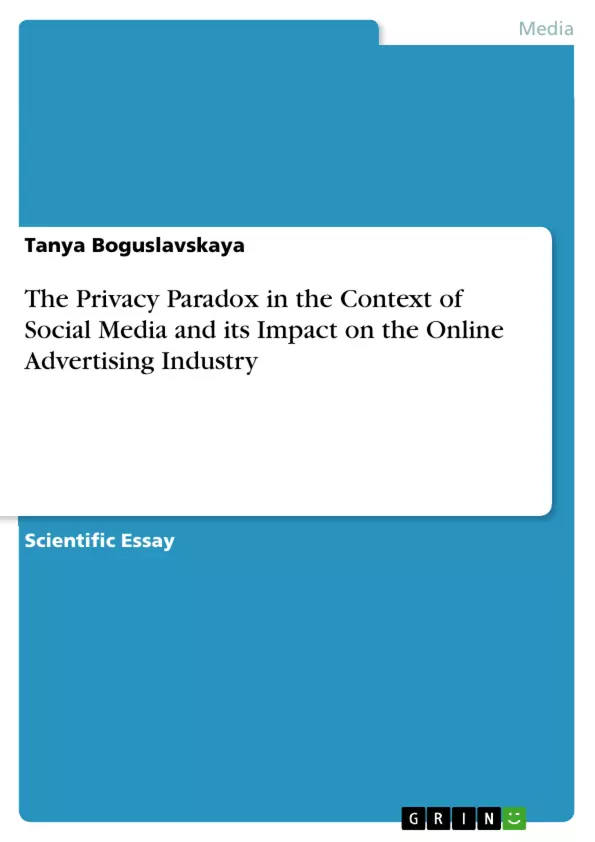Targeting has proven to be more effective than the standard run-of-network advertising. However, primarily due to the vast aggregation of consumer data, it arouses certain privacy concerns among internet users.
This study proposes the necessity of digital advertising regulation by the means of allowing consumers to opt out of online tracking. It is also argued that such regulations will not affect the advertising industry in a negative way due to the existence of the privacy paradox.
Inhaltsverzeichnis (Table of Contents)
- Abstract
- Targeted Advertising and Online Privacy
- Privacy Paradox and Online Advertising Regulation
- Research Objectives
- Hypothesis and Problem Statements
- Theoretical and Practical Significance
- Targeted Advertising Efficiency
Zielsetzung und Themenschwerpunkte (Objectives and Key Themes)
This research paper explores the regulation of digital advertising, focusing on the influence of the privacy paradox on targeted advertising regulation. Its primary aim is to investigate whether online privacy concerns of internet users can hinder the development of the online advertising industry, which heavily relies on behavioral advertising.
- Understanding the targeting mechanism and its utilization of consumer personal data
- Identifying the major privacy concerns of social media users
- Defining the privacy paradox within the context of social networking sites
- Analyzing the attitudes of social media users towards personalized advertising
- Investigating the interdependence between online privacy concerns and the development of the online advertising industry
Zusammenfassung der Kapitel (Chapter Summaries)
- Abstract: Briefly introduces the study's focus on the privacy paradox and its impact on online advertising regulation. Highlights the need for digital advertising regulation and argues that such regulation will not negatively affect the advertising industry due to the privacy paradox.
- Targeted Advertising and Online Privacy: Discusses the evolution of personalized advertising, highlighting its benefits for both advertisers and publishers while acknowledging the privacy concerns of internet users. It explores the increasing pressure on governments to regulate data collection and usage.
- Privacy Paradox and Online Advertising Regulation: Examines the concept of the privacy paradox, where users express concerns about online privacy but often do not act accordingly. This section suggests that the privacy paradox may provide a solution for the advertising industry to address user concerns and avoid regulations.
- Research Objectives: Outlines the specific goals of the study, including a comprehensive overview of the targeting mechanism, identification of user privacy concerns, and analysis of attitudes towards personalized advertising. It aims to provide expert opinions on the relationship between privacy concerns and online advertising, examine regulatory strategies, and develop guidelines for personalized advertising.
- Hypothesis and Problem Statements: Presents the hypothesis that enabling opt-out tracking will not negatively affect targeted advertising performance, contrasting with government regulations on data collection. It further outlines key problem statements related to the effectiveness of targeting, the impact of government regulations, the potential for opt-out options, and the necessity of ensuring both privacy and advertising effectiveness.
- Theoretical and Practical Significance: Emphasizes the uniqueness of this research, focusing on the impact of the privacy paradox on the online advertising industry. It distinguishes itself from existing works that primarily focus on the causes of the privacy paradox or the influence of privacy concerns on behavioral advertising. The practical value of the study lies in the proposed guidelines for targeted advertising that minimize privacy concerns.
- Targeted Advertising Efficiency: Briefly highlights the effectiveness of targeted advertising compared to traditional run-of-network advertising. It cites research findings demonstrating higher conversion rates for targeted advertisements and the growing spending on targeted advertising since 2008.
Schlüsselwörter (Keywords)
This research explores the interplay between online privacy, targeted advertising, and the privacy paradox. Key concepts include consumer data collection and usage, personalized advertising, opt-out options, and regulatory frameworks. The study aims to understand how the privacy paradox influences the development and regulation of online advertising, particularly in the context of social media.
Frequently Asked Questions
What is the "Privacy Paradox" in social media?
The privacy paradox refers to the phenomenon where users express high concerns about their online privacy but continue to share personal data freely on social networks.
How does targeted advertising utilize consumer data?
Targeted advertising uses behavioral tracking and personal data aggregation to show ads that are specifically relevant to the individual user's interests.
Will digital advertising regulations hurt the industry?
The study argues that allowing consumers to opt out of tracking will not negatively affect the industry due to the existence of the privacy paradox.
Why is targeted advertising considered more effective?
Research shows that targeted ads have much higher conversion rates compared to standard run-of-network advertising, making them more valuable for advertisers.
What is the proposed solution for balancing privacy and advertising?
The study suggests implementing clear opt-out options for consumers, which addresses privacy concerns without necessarily reducing the overall effectiveness of behavioral advertising.
- Quote paper
- Tanya Boguslavskaya (Author), 2015, The Privacy Paradox in the Context of Social Media and its Impact on the Online Advertising Industry, Munich, GRIN Verlag, https://www.grin.com/document/318192



